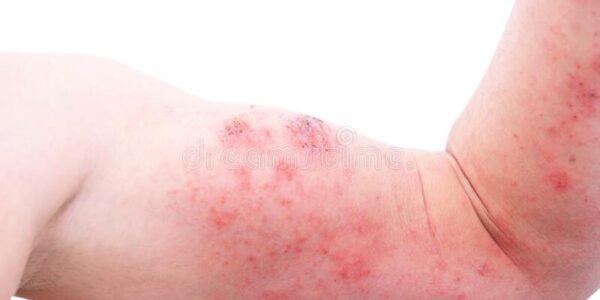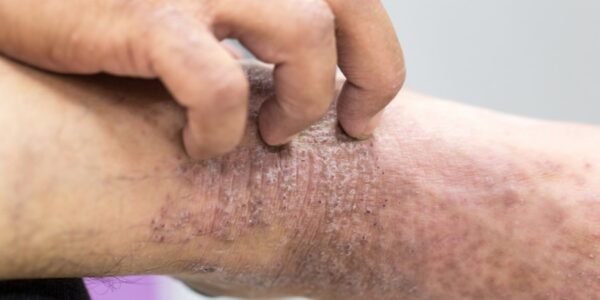Eczema (Atopic Dermatitis)
Eczema (Atopic Dermatitis) also known as Eczema, Chronic Allergic Dermatitis, Atopic Dermatitis, Recurrent Inflammatory Skin Disease, Chronic Allergic Itching, Chronic Lichenified Dermatitis
What is Eczema?
Eczema (atopic dermatitis) is a non-contagious inflammatory skin condition characterized by itchy rashes with redness, sometimes with small blisters that easily break and then leak liquid discharges. As mentioned, it is not a contagious disease, i.e., non-infectious. It can occur in all age group, but It’s more common in children. The prevalence of the condition is about 15% in children and nearly 4% in adults. Due to severe scratching followed by broken skin, bacterial infection can add up and result in redness, blisters and pustular skin ailments.

But why it happens?
The cause of Eczema is unknown. In 30-40% of cases, it is due to Atopic / Allergic conditions. Some people are prone to respond severely to allergens (i.e., the substances which trigger allergies). Their immune system reacts to these allergens more than others and releases antibodies, which causes inflammation in various parts of the body. This increased reaction to allergens happens because of genetic predisposition, lifestyle issues and environmental factors. Some scientists consider vaccines are associated with Eczema, though substantiating proof is not available. An individual with atopic tendency can also suffer from, Asthma, recurrent sinusitis, urticaria etc., alternatively.
Risk Factors
- Family history of Eczema, i.e., the genetic factors
- Child not exposed to allergens in their early childhood
- Asthma
- Hay fever
- Chronic stress and anxiety
What are the symptoms of the condition?

- Moderate to severe scratching, rubbing. Itchy more at night
- Dry skin cracked, scaly at times thickened.
- Red patches more at the bend of elbow, knees, neck, wrist and face.
- After scratching the skin, the skin becomes raw, sensitive and swollen.
- Some small raised bump may leak fluid after scratching.
- Eczema usually comes and goes, sometimes with ointments or seasonally, or the severity may vary.
What are the complications of Eczema?
Atopic dermatitis is not a life-threatening condition, but certain conditions may precipitate if not treated adequately. The conditions which may develop are:-
- Bacterial infections: May happen by various bacterias. Out of which, the Staphylococcus aureus can cause severe skin/ soft tissue infection.
- Herpes infections: Herpes virus can enter through cracked skin.
- Fever or tiredness: There may be fever or elevated body temperature due to IgE reaction or secondary infection by bacteria or virus.
Lichenification: It develops from repeated rubbing or itching, resulting in hardened, keratinized, rough patches of skin due to chronic affection of the same area of the skin like ankles, elbows, face, knees, wrist & neck areas, the skin of that area becomes thick and may become challenging to cure.
Are there any Laboratory tests required for diagnosis?
Ideally, Eczema (atopic dermatitis) can be easily diagnosed clinically and by a thorough history of the case. However, to confirm the allergic background, allergy tests, serum IgE etc., are done. Depending on the presentation and severity, some other investigations may be advised.
Is there any self-helps?
People with a significant family history of any atopic condition can rarely prevent it. So better to manage it scientifically. It would be best if you were patient and do not get discouraged with it.
- Use Moisturizer at least twice a day.
- Take shorter bathing.
- Use a gentle soap.
- Avoid such things that worsen the condition.
- Wet-Wrap Therapy: Warm water is applied in the affected area for 15-20 minutes and then is patted dry, and some non-dripping lotion is applied on the skin for 3-4 hrs. The wrap helps to reduce the itching and to soften the keratinized skin.
- Some drinks containing Probiotic Bacteria may be of help.
- Practice various stress-relieving techniques like meditation, pranayama, listening to soft music etc.
How can Homeopathic treatment be of help?
The problem with using strong chemical ointment may give temporary relief. Still, it mainly suppresses the disease condition. Whereas, Homoeopathic medicines act well in skin diseases. It can provide relief to the patient, reduce the itching, frequency and severity of the disease; if disease pathology has not become complex, properly prescribed Homeopathic medicines given in the appropriate potency and dosages can provide long-term relief to the condition. The atopic tendency of the person also improves.
By taking note of the patient’s holistic symptomatology and selecting the appropriate homoeopathic medication, internal and external factors, including the mental reason for aggravating the ailment, are also taken care of. The overall condition improves through prolonged Homeopathic medication. And that too without any side-effects!
So why wait? Let’s take decisive action to adopt homoeopathy within the comfort of your home and not losing confidentiality. We will deliver the medicines at your doorstep too!